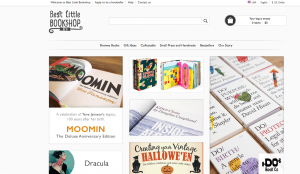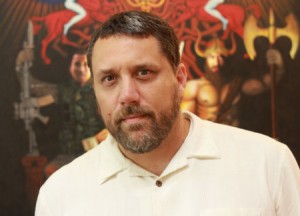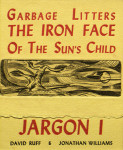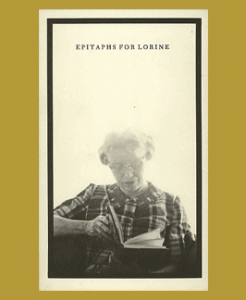Paul Ingram: The Lost Clerihews of Paul Ingram
October 25, 2014 by David
Filed under Poetry, WritersCast
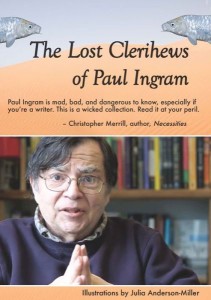 The Lost Clerihews of Paul Ingram – 978-1-888160-77-2 – paperback original – Ice Cube Press – $19.95 (no ebook edition!)
The Lost Clerihews of Paul Ingram – 978-1-888160-77-2 – paperback original – Ice Cube Press – $19.95 (no ebook edition!)
The clerihew is a somewhat obscure form of poetry invented by the English writer Edmund Clerihew Bentley as an alternative to the limerick. It has a particular focus, which is to skewer or make fun of a famous person, is only four lines long, with irregular line length and meter. Rhymes follow the AABB structure with as much humorous contrivance as possible to do what needs to be done to accomplish the goal of the poem – fun at the expense of a well known individual.
I first was introduced to this form by my old friend and mentor, Jonathan Williams, whose quirky and creative sense of humor was perfectly fit for this fun form. He wrote a wonderful book called the Fifty Two Clerihews of Clara Hughes, which is well worth seeking out (produced in a limited edition and long out of print, but should be available in a few libraries, and I found a audio version of it online.)
Brits invented the form and seem to like it a lot. Auden wrote clerihews and so did Bentley’s friend G.K. Chesterton. One of Bentley’s earliest clerihews is still one of his best:
Sir Christopher Wren
Said, “I am going to dine with some men.
If anyone calls
Say I am designing St. Paul’s.
And now we have another great collection of clerihews, written by the hilarious and well read Iowa City based bookseller, Paul Ingram. Paul has been a friend of mine (and of hundreds of writers) for a long time. He’s known far and wide as one of the great booksellers and talkers about books and visitors to Iowa City seek him out at the wonderful Prairie Lights Bookstore* to talk to him about books.
As he tells us in the introduction to his book, Paul has been writing clerihews for more than twenty years, mostly as the spirit struck, often on tiny pieces of paper that seemed to disappear. Thus the “lost” in the title of the book. We can only be grateful that this packrat managed to keep and find most of the poems he wrote so that we can enjoy them here. As Roz Chast says “after you read it, you will need to put aside whatever important work you are doing and write several of your own.” Clerihews are like candy.
Almost all of Paul’s clerihews are fun, hilarious, some are political, and some are much more weighty than the form suggests, like this one:
General Custer
Lost all of his luster,
And most of his pride
On his final ride
It is difficult to resist consuming this book like candy. I enjoyed having the chance to hear Paul about his own writing, poetry and book selling. You will too. This is a fun book with alot to say. Like the author himself.
Paul’s book has wonderful illustrations by the Chicago artist Julia Anderson-Miller. Publisher website here.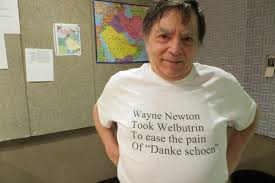
*I interviewed Jan Weissmiller, proprietor of Prairie Lights, for Writerscast a few years ago,
Podcast: Play in new window | Download
Mark Chiusano: Marine Park (Stories)
October 12, 2014 by David
Filed under Fiction, WritersCast
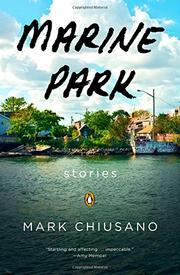 Marine Park: Stories – 978-0143124603 – paperback original – Penguin Books – $15.00 – ebook versions available at lower prices
Marine Park: Stories – 978-0143124603 – paperback original – Penguin Books – $15.00 – ebook versions available at lower prices
Mark Chiusano grew up in Marine Park, perhaps the most isolated and least well known neighborhood of the now hip New York borough of Brooklyn. He spent some of his summers playing baseball in Switzerland.
He went to Harvard University, where he was the recipient of a Hoopes Prize for outstanding undergraduate fiction. Mark is still young – mid-twenties – but has been a prolific writer of short stories since college, some of which have appeared in literary magazines, including Guernica, Narrative, Harvard Review, and online at Tin House and The Paris Review Daily.
This first book is a collection of stories called Marine Park, after his boyhood neighborhood. It’s a diverse collection, but linked by tone, perspective, and some recurring characters. Stories revolve around kids growing up in the tight-knit neighborhood, portraits of its denizens, adventures and misadventures. Eight of the stories, perhaps the core of the book, revolve around the brothers Jamison and Lorris, as they grow up from late childhood into adults in the almost present. Overall, these are really well written stories, any one of which can stand alone, but collected, create a cohesive outlook and impact on the reader. There’s a palpable love and joy that shines through the narratives without ever falling prey to sentimentalism.
This is clearly a first book, with some stories seeming to experiment with different manners and tropes, as the author is feeling his way toward his authentic voice. But Chiusano is such a fine stylist, we tend to forgive any missteps or methodological repetitions. He is an original voice in many ways and we can expect more great writing from him as his work continues to grow.
Chiusano is now an editor at Vintage Books and is working on his next book.I’m guessing that his work, where he must spend time reading and editing other writers’ work will help make him even better than he already is. I’m looking forward to reading more from this fine new writer. I think you will find our conversation both interesting and revealing of how a wonderfully creative writer thinks about the work.
This interview was recorded at John Marshall Media, New York City in summer 2014.
Author website – where you can find a great quote about the book: “Here’s the spirit of dear Sherwood Anderson in Mark Chiusano’s Marine Park.”—Ron Carlson
Podcast: Play in new window | Download
David Wilk talks to Kieron Smith about The Best Little Bookshop
October 2, 2014 by David
Filed under PublishingTalks, The Future
 Publishing Talks began as a series of conversations with book industry professionals and others involved in media and technology about the future of publishing, books, and culture. As we continue to experience disruption and change in all media businesses, I’ve been talking with some of the people involved in our industry about how they believe publishing might evolve as our culture is affected by technology and the ebb and flow of civilization and economics.
Publishing Talks began as a series of conversations with book industry professionals and others involved in media and technology about the future of publishing, books, and culture. As we continue to experience disruption and change in all media businesses, I’ve been talking with some of the people involved in our industry about how they believe publishing might evolve as our culture is affected by technology and the ebb and flow of civilization and economics.
I’ve now expanded the series to include conversations that go beyond the future of publishing. I’ve talked with editors and publishers who have been innovators and leaders in independent publishing in the past and into the present, and will continue to explore the ebb and flow of writing, books, and publishing in all sorts of forms and formats, as change continues to be the one constant we can count on.
It’s my hope that these conversations can help us understand the outlines of what is happening in publishing and writing, and how we might ourselves interact with and influence the future of publishing as it unfolds.
UPDATE: as of January 27, 2015, it was announced that (sadly) Best Little Bookshop will be closing and Kieron Smith moving on to other pursuits. Still, this discussion ought to remain interesting to anyone who is thinking about bookselling and consumer interaction with books.
Kieron Smith is a long time bookseller and founder of the new online bookstore, The Best Little Bookshop. This new site takes a different approach to online retail book selling than others have done. There is much more emphasis on curation, more in-depth presentation of books and publishers, social interaction onsite from customers, and importantly, the participation of other booksellers from the outset. And the store, while based in the UK, is friendly to buyers from other countries. I’ve spent a fair amount of time playing around with BLB, and for me, it’s a great experience. I’ve discovered books and publishers I’ve never heard of and that I am interested in reading and buying. I’m looking forward to seeing how Kieron and his team integrate other booksellers into the store experience and how its community of users will influence the direction the store takes in the future.
Best Little Bookshop is clear evidence that it is possible to create new models of retail book selling online. The store launched in summer 2014, so as of now, there are still features in development, and doubtless more changes and improvements to come. My conversation with Kieron was exciting for me, as I see so much potential with this site for publishers, authors and readers, and wanted to hear first hand how the founder views the future. One interesting point – no ebooks here, just print.
Alert: this is a relatively long interview at 41 minutes. Take your time and enjoy!
Kieron Smith has over 17 years of book trade experience, starting with WHSmith Retail, establishing the multi-channel Ottakars.co.uk website in 1999, heading up the web offering at BCA and operations at Methven’s Booksellers, followed by three years outside the industry at Europe’s leading video games website GAME.co.uk. Head of online for Waterstones.com in 2006-7 and then MD of international online book retailer The Book Depository (purchased by Amazon in 2011) for five years until November of 2013. The Book Depository was acquired by Amazon.com in 2011.
Podcast: Play in new window | Download
Loren Glass: Counterculture Colophon
August 5, 2014 by David
Filed under Non-Fiction, WritersCast
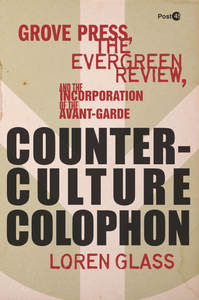 Counterculture Colophon: Grove Press, the Evergreen Review, and the Incorporation of the Avant-Garde (Post*45) – 978-0804784160 – Stanford University Press – Hardcover – $27.95 (ebook versions available at substantially lower prices)
Counterculture Colophon: Grove Press, the Evergreen Review, and the Incorporation of the Avant-Garde (Post*45) – 978-0804784160 – Stanford University Press – Hardcover – $27.95 (ebook versions available at substantially lower prices)
This book has turned out to be one of the most influential on my recent thinking about publishing and how it should work, proving that history can tell us a great deal about both the present and the future. Grove Press was immensely influential in changing American culture from the 1950s through the 1980s, and remains meaningful today, with its massive backlist representing the golden age of the literary avant-garde of that time. Its longtime owner and spiritual leader, Barney Rosset, has been an almost mythic hero to many who got into publishing because of what he accomplished with Evergreen Magazine and Grove Press. How a publisher could become so powerfully influential makes for a terrific and inspiring story.
Grove’s accomplishments and innovations are legion and well documented by Loren Glass in this book. While Counterculture Colophon is written as an academic history, and sometimes Glass falls prey to academic terminology that may put off the non-scholarly readers, I was happy to overlook the academic jargon and focus on the compelling story he tells of Grove and what it has meant for modern publishing.
This heroic and sometimes tragic saga reminds us of what it means to be a passionate and committed publisher. It’s difficult for anyone alive today to believe that up until the 1960s it was illegal to publish and sell literary books that included sexually explicit content. Battles were fought – and finally won at great expense – by Grove Press against the US government and many local jurisdictions over DH Lawrence’s Lady Chatterley’s Lover, Henry Miller’s Tropic of Cancer and William Burroughs’ notorious Naked Lunch. These cases literally led to “the end of obscenity” and created the groundwork that has enabled modern literary publishing to flourish in our time.
Rosset and Grove, together with myriad editors and publishers in Paris, London, San Francisco, and New York, were at the heart of a revolution in publishing, both in content and in form that in many ways inspired and led directly to an equivalent revolution in the overall American culture, that reverberates today. Grove was at the heart of political, cultural and literary ferment in North America, introducing new voices not only from here, but from around the world, to American readers. Rosset more or less invented the trade paperback, and was a leader in introducing trade books to be used as supplemental reading for college courses, of course hitting its stride at the very moment that the Baby Boom generation went to college. The magazine and press brought an emerging set of writers to an emerging generation of readers, inspiring and changing the way millions read and thought about writing, politics, theater and art. Grove Press was as much a cultural institution as it was a publisher.
And, importantly, what this book most strongly highlighted for me is the meaning and power of a publisher’s brand. It is widely accepted that most publishers today have no identity with readers. Grove Press and its house literary journal, the Evergreen Review, were made into powerful and coherent brands that recognized the publisher as enabled it to introduce formerly unknown writers and artists to their audiences. Using graphics, typography and a consistently subversive publishing program, Grove was able to become a recognized brand for readers, the power of which, seemingly very few publishers have understood or been able to duplicate.
Counter Culture Colophon is a book I strongly recommend to anyone interested in contemporary literature and of course, publishing. Loren Glass was able to interview Rosset and many other principle players in the story of the press. And for many, it will be a truly inspiring tale.
Loren Glass is a Professor of English at the University of Iowa. There is a really nice video of Glass speaking about Rosset and Grove at the Chicago Humanities Festival here. (55 minutes)
Podcast: Play in new window | Download
David Wilk talks with Andrew Lipstein about 0s and 1s
July 20, 2014 by David
Filed under Ebooks and Digital Publishing, PublishingTalks, The Future
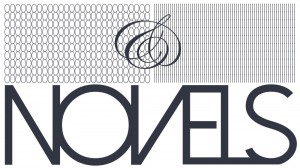 Publishing Talks began as a series of conversations with book industry professionals and others involved in media and technology about the future of publishing, books, and culture. As we continue to experience disruption and change in all media businesses, I’ve been talking with some of the people involved in our industry about how they believe publishing might evolve as our culture is affected by technology and the ebb and flow of civilization and economics.
Publishing Talks began as a series of conversations with book industry professionals and others involved in media and technology about the future of publishing, books, and culture. As we continue to experience disruption and change in all media businesses, I’ve been talking with some of the people involved in our industry about how they believe publishing might evolve as our culture is affected by technology and the ebb and flow of civilization and economics.
I’ve now expanded the series to include conversations that go beyond the future of publishing. I’ve talked with editors and publishers who have been innovators and leaders in independent publishing in the past and into the present, and will continue to explore the ebb and flow of writing, books, and publishing in all sorts of forms and formats, as change continues to be the one constant we can count on.
It’s my hope that these conversations can help us understand the outlines of what is happening in publishing and writing, and how we might ourselves interact with and influence the future of publishing as it unfolds. This new interview reflects my interest in the history of independent literary publishing, an area in which I have been active for a long time. And this particular conversation reflects some longstanding personal relationships as well.
Andrew Lipstein is one of the new wave of writers interested in changing the way books are published, distributed and read. When I first read about his new venture 0s and 1s, I was immediately interested (that’s “zeroes and ones” – I misread it initially as “os and 1s” and you will hear that in my interview with Andrew). 0s and 1s is a curation project, offering ebooks for download at very attractive prices selected from a limited number of like-minded independent publishers. It is diametrically opposed to the way we have been trained to think about ebook retailing, where for the most part, readers are tied to the ecosystems created by the platform owners.
For example, if you are a Kindle reader, you buy all your ebooks from Amazon, for example, and whether you know it or not, or care or not, your choices of what to read, or what to think about reading, are highly contextualized. Online ebook stores have incredible limitations, and ironically, the huge breadth of titles potentially available to readers ultimately mean a hegemonically limited selection of reading possibilities.
As Andrew states on the 0s and 1s site: “The selling of digital books has become an oligopoly, with only a few important players—& a lot of power. The world of e-reading shouldn’t be proprietary to any one brand, reader, or (set of) publishers. Selling a digital book is as simple as transmitting a series of zeroes & ones, & there’s never been a better time to take advantage of that fact.”
Personally, I think it’s an opportune moment for publishers and writers to start experimenting with alternative models of engaging with readers. Andrew and the publishers and authors he is promoting here deserve credit and support for taking a necessary step toward demonstrating how we might imagine alternatives to big box retail book selling and a better way to promote a culturally diverse and meaningful reading culture. 0s and 1s is aware of the need to explain to readers what it’s doing by selling all its ebooks at $6 each and has a very clear explanation of why this is good for authors on its website.
Andrew Lipstein is a writer too, and also curates a really interesting micro-publishing site, well worth a visit, called Thickjam.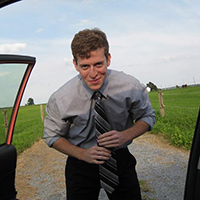
In many ways this project reminds me of some of the experiments in independent book distribution and marketing from the seventies (many supported by what was then called CCLM, the Coordinating Council of Literary Magazines – now called CLMP – with a grant from the Ford Foundation). Some of those projects were highly influential and in various forms lasted for a number of years. I hope we can say the same about 0s and 1s in the future.
If you’re interested in the history of CCLM and CLMP and the organization’s key role in supporting independent magazine and book publishers, there is a nice bit of history here. The Publishing Talks interview with CLMP’s current dynamic director Jeffrey Lependorf is here. You can find links to publishers participating in the 0s and 1s project here. One of the several distribution projects funded by CCLM and the Ford Foundation was Truck Distribution Service, started in St. Paul, MN, by yours truly, which later became the very successful small press wholesaler, Bookslinger, and another was the still flourishing Writers and Books, founded in Rochester, NY, by Joe Flaherty.
Thanks to John Marshall Media and engineer Nathan Rosborough for this recording.
Podcast: Play in new window | Download
Sean Davis: The Wax Bullet War – Chronicles of a Soldier & Artist
June 21, 2014 by David
Filed under Non-Fiction, WritersCast
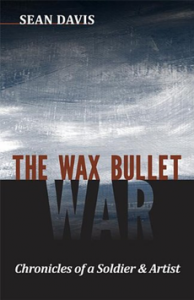 The Wax Bullet War: Chronicles of a Soldier & Artist – 978-1932010701 – paperback – Ooligan Press – $16.95 (ebook version available at lower prices)
The Wax Bullet War: Chronicles of a Soldier & Artist – 978-1932010701 – paperback – Ooligan Press – $16.95 (ebook version available at lower prices)
Sean Davis grew up in Oregon, joined the Army after high school, went to art school for awhile, had an unsuccessful relationship with an attractive woman, and was working at an unsatisfactory job as a highway worker on September 11, 2001. The next day he walked into the Oregon National Guard recruiting office and re-enlisted, on the working assumption that he would be contributing to the greater good and giving himself a sense of direction and meaning. He had no idea he would soon end up on active duty in Iraq on the front lines of the war trying to figure out how to be a sensitive warrior in a strange country.
Davis is a talented writer and exceptional memoirist with a keen eye for details and a wry sense of humor. In Iraq he lost his best friend in an ambush and was himself critically wounded. He returns home after a lengthy period of recovery to deal with the aftermath of his experiences and suffers through what we now know is so common for the veterans of our seemingly endless recent wars, alcohol and drug dependency and a minimally helpful support system. Somehow, Davis managed to rediscover the interior place where his art comes from and was able to rebuild his life. He now has a family, an advanced degree, is actively an artist and a writer, and has created a nonprofit organization (A Rock or Something Productions: “veterans getting veterans into the arts”) to connect other veterans to the healing power of the arts.
Davis recounts the seeming insanity of daily life in the war zone with humor and clarity, and clearly cares deeply about the civilians he encountered in Iraq as well as the men and women with whom he served. As an example, the wax bullets in the title were what was used in training exercises in Kuwait prior to active deployment – to save money. Evidently it escaped the thinking of military planners that in the plus 100 degree temperature there, the bullets would melt, fouling the soldiers’ guns, wasting time and endangering their lives. This is not the only example of how things go wrong for US soldiers and the Iraqi people in the midst of the war, which Davis describes with a soldier’s sense of black humor.
His description of what happened to him after he returned home is terrifying and powerful. When he does rediscover himself, we are right there with him, joined with his indomitable spirit to become someone better, someone who can be alive and present and fully engaged in the beingness of humanity.
The Wax Bullet War is a beautiful book, incredibly moving and compelling. I’d recommend adding it to the short list of great books about war and specifically about the real experiences of soldiers who fight and then must live their lives in time of peace. Put aside some quiet time to read it and let it sink in. Sean Davis website. Publisher Ooligan Press website.
Sean Davis bio: Sean Davis is an artist, writer, and returning veteran of the Iraq War. He earned a bachelor’s degree in English from Portland State University and an MFA in Writing from Pacific University. His previous work includes the novel Motivation and Toleration, published under the name Ian Avi, as well as contributions to the Portland Mercury, Nailed Magazine, and Split Infinitive. He has appeared on 60 Minutes and is one of the cofounders of Hubris Press in Portland, where he lives with his wife and daughters.
Podcast: Play in new window | Download
David Wilk and Thomas Meyer talking about Jargon Society
May 26, 2014 by David
Filed under Publishing History, PublishingTalks
 Publishing Talks began as a series of conversations with book industry professionals and others involved in media and technology about the future of publishing, books, and culture. As we continue to experience disruption and change in all media businesses, I’ve been talking with some of the people involved in our industry about how they believe publishing might evolve as our culture is affected by technology and the ebb and flow of civilization and economics.
Publishing Talks began as a series of conversations with book industry professionals and others involved in media and technology about the future of publishing, books, and culture. As we continue to experience disruption and change in all media businesses, I’ve been talking with some of the people involved in our industry about how they believe publishing might evolve as our culture is affected by technology and the ebb and flow of civilization and economics.
I’ve now expanded the series to include conversations that go beyond the future of publishing. I’ve talked with editors and publishers who have been innovators and leaders in independent publishing in the past and into the present, and will continue to explore the ebb and flow of writing, books, and publishing in all sorts of forms and formats, as change continues to be the one constant we can count on.
It’s my hope that these conversations can help us understand the outlines of what is happening in publishing and writing, and how we might ourselves interact with and influence the future of publishing as it unfolds. This new interview reflects my interest in the history of independent literary publishing, an area in which I have been active for a long time. And this particular conversation reflects some longstanding personal relationships as well.
Jargon Society, founded in 1951 by poet, essayist and photographer Jonathan Williams (1929-2008), was operated for many years by Jonathan alone, then with friends and associates, and later with his life partner, the poet Thomas Meyer. The long list of Jargon publications reflects the aesthetics, thinking, whimsy and artistic vision of Jonathan Williams, for whom the press was, along with his own writing and deep friendships, his life’s work. Jonathan’s commitment was singularly to find and present the unusual, mostly brilliant, sometimes quirky work of writers, artists and photographers those he believed in and found exalting, transformative, and sometimes just plain strange.
Over the course of a half century, beginning when he was a student at Black Mountain College in North Carolina studying with Charles Olson and other mid-century writers, artists and thinkers, Jargon published an incredible range of highly individualized creators, some now famous and fully accepted into the American canon. The list of books and broadsides and other works published by Jargon numbers 115 pieces, and wonderfully reflects the enthusiasms of Jonathan’s life. Included are early works by Black Mountain identified writers like Charles Olson, Robert Duncan, Robert Creeley and Joel Oppenheimer, then unknown but now well known writers like Denise Levertov, Kenneth Patchen, Michael McClure, Guy Davenport, Gilbert Sorrentino, Louis Zukofsky, Buckminister Fuller and Larry Eigner, and outliers like Douglas Woolf, Peyton Houston, Alfred Starr Hamilton and Bill Anthony. Still others must be accounted to Jonathan’s indefatigable championing of the then virtually unknown writers whom he felt must be shared, including Lorine Niedecker and Mina Loy.
The photography books on the list represent JW’s brilliant visual sensibilities, and include work by Doris Ulmann, Lyle Bonge, Ralph Eugene Meatyard, John Menapace and Elizabeth Matheson, among others, altogether a meaningful aesthetic contribution to photographic publishing. And so do the books on outsider art (which Jonathan was following long before the popular culture caught on).
In all cases, at all times, Jargon books were reflective of Jonathan Williams’ extreme commitment to making beautiful books whose look and feel would always do justice to the writing, photography and art within.
Williams and Meyer, along with a diverse cast of supporters throughout the world, devoted an immense amount of time and energy raising money for the varied endeavors of the Jargon Society. Fundraising was, it seemed, almost as much work for the press’ principals as creating great books. Asking people with money to support the kind of literature and art they might not themselves find compelling is not an easy thing to do. Making pleas for money year after year can be exhausting and it is rare today to find an arts organization whose founder maintains the role of chief fundraiser throughout its history.
Jonathan Williams and Tom Meyer have been hugely influential to my own work as a writer, editor, and publisher. For me they each exemplify the committed life of the artist. Over the years I published two books of Jonathan’s poems and will soon publish his third and final collection of essays. Over the years I often visited Jonathan and Tom in Highlands, North Carolina, and learned a tremendous amount from both of them, as well as developing deep and long lasting friendships with both. And for a number of years, Inland Book Company, the company I co-founded, was the primary distributor for Jargon, a great and sometimes sobering experience for all of us whose responsibility was to sell these quirky and decidedly noncommercial creations.
Jonathan Williams was always a prolific letter writer; correspondence with the ever witty Williams was a deep and abiding pleasure.
Jargon is an exemplar of what a modern literary press can be: individualistic in the extreme, with a compelling vision of the breadth of art and and our experience of its varied forms, expanding the horizons of all who have the opportunity to be touched by the works and their beautiful singularities.
Recently, in order to continue the legacy of the Jargon Society, Tom has gifted the press and its books to the Black Mountain College Museum and Art Center, where its work can continue in a new context.
I wish I had been working on this interview series long enough ago to have talked to Jonathan Williams with the recorder running. But it was my great pleasure to talk to Tom Meyer about Jargon Society, and of course Jonathan himself, with whom he partnered and worked for forty years. This is a one hour conversation packed with information, evoking the history of one of the great literary accomplishments of the twentieth century.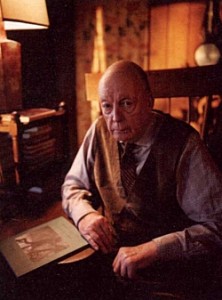
A Jargon Society bibliography checklist was published by the extraordinary and wonderful Jacket online magazine.
Appreciation of Jonathan and Jargon by Ron Silliman; an interview with Jonathan by Leverett T. Smith here; feature on JW in Jacket 38.
(Photos of Tom Meyer and Jonathan Williams by Reuben Cox)
Podcast: Play in new window | Download
Mary Kay Zuravleff: Man Alive!
May 18, 2014 by David
Filed under Fiction, WritersCast
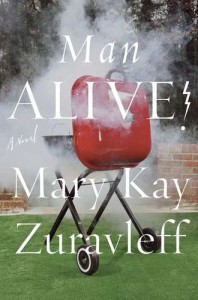 Man Alive! (a novel) – 978-0374202316 – Hardcover – Farrar, Straus & Giroux – $25.00 – eBook versions available (and paperback to be published October, 2014)
Man Alive! (a novel) – 978-0374202316 – Hardcover – Farrar, Straus & Giroux – $25.00 – eBook versions available (and paperback to be published October, 2014)
I loved reading this book. It has a great sense of humor, it’s complex without being too serious about itself, and a story that grabs you from the beginning and won’t let go. Mary Kay Zuravleff is a terrific writer, original and entertaining. And there’s a lot going on to keep you thinking throughout. Man Alive! tells a great story. Rather then me bending myself into a pretzel to tell you about it without giving away too much, here’s the author’s own short summary (from her terrific website – just like her writing, a busy and interesting place to visit):
The one-paragraph version, no spoilers:
All it takes is a quarter to change Owen Lerner’s life. When lightning strikes the coin he’s feeding into the parking meter, the pediatric psychiatrist survives, except that now he only wants to barbecue. The bolt of lightning that lifts Dr. Lerner into the air sends the entire Lerner clan into free fall, and Man Alive! follows along at that speed, capturing family-on-family pain with devastating humor and a rare generosity. This novel explores how much we are each allowed to change within a family—and without.
I’m late getting this interview posted. I talked to Mary Kay shortly after Man Alive! was published in late 2013. I wish I had known about her work before, but at least now I know I have two more books of hers to read. And I am looking forward to her next book. It’s not often you can have this much fun with a novel. Talking with her about this novel, as well as how she works as writer, was a distinct pleasure, and very entertaining. She is as fun to talk to as it is to read her work. Alice McDermott called her writing “exuberant.” I can’t think of a better word myself.
Mary Kay’s previous novels were The Bowl Is Already Broken and The Frequency of Souls. She received the American Academy’s Rosenthal Award and the James Jones First Novel Award, and was nominated for the Women’s Prize for Fiction. She lives in Washington, D.C., with her husband and two children. Mary Kay serves on the board of the PEN/Faulkner Foundation and is a cofounder of the D.C. Women Writers Group.
Podcast: Play in new window | Download
Tony Vanderwarker: Sleeping Dogs – a Novel
April 26, 2014 by David
Filed under Fiction, WritersCast
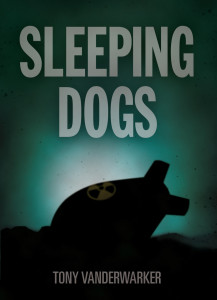 Sleeping Dogs: A Novel – 978-1940857039 – Paperback – AuthorPress Publishing – $16.95 (ebook versions available at lower prices)
Sleeping Dogs: A Novel – 978-1940857039 – Paperback – AuthorPress Publishing – $16.95 (ebook versions available at lower prices)
Tony Vanderwarker had a successful career in advertising before he decided to write fiction. I think advertising is an interesting training ground for a novelist, since in so many ways, advertising is about telling stories that are powerful and compelling and of course get across their emotional content very efficiently. Everyone seems to want to be a writer these days, and I think there are a lot of really good books being written and published by late blooming authors, who had successful careers in one field or another, but who always really wanted to write. And doubtless there are more than a few that are not so great.
Tony Vanderwarker has a great story to tell – not just in his novel, Sleeping Dogs, but in how this book came to be written. And he’s written another book about the writing of Sleeping Dogs called Writing with the Master (Lyons Press). Tony was lucky enough to have met John Grisham, who was a neighbor, when their sons played youth football together. They struck up a friendship, though Tony never talked about his own writing with his world famous author friend, until one day he did, and Grisham offered him the incredible gift of his mentorship and working assistance with the writing of Tony’s novel. Vanderwarker gives full credit to Grisham for teaching him how to be a real novelist, no small feat for anyone.
In Sleeping Dogs, Vanderwarker tells a terrific story based on the fact that there are at least eleven known Cold War era nuclear warheads scattered around the U.S. from various accidents and crashes from the period when America kept a fleet of B-52s constantly aloft to defend against a Soviet attack. In a non-stop action packed story, Howie Collyer, who has been obsessed with danger posed by the lost nuclear weapons, comes across an old B-52 pilot who can verify the location of one of the bombs.
Unbeknownst to Collyer, he is being tracked by a sophisticated terrorist cell whose aim is the locate the bomb and use it for their own gruesome purposes. And he is also being pursued by a secret unit of the Pentagon whose job is to quash any information about the lost nuclear weapons. Collyer gets help along the way from a nursing home nurse and a buddy in the CIA, but his family is at risk and so is he at every turn, after he kidnaps the old pilot to try to uncover the location of the bomb he thinks is closest to and therefore most dangerous to the safety of the U.S. east coast.
It’s one of those books you don’t want to put down, not just because the story is gripping and the twists and turns exciting, but the characters in this book are believable and sympathetic, and it’s easy to root for them to win against all the different bad guys they are faced with.
With a book like this, I prefer to not give away too much of the story when talking to the author, so readers can enjoy the discovery of the story and characters for themselves, and in this case, because Vanderwarker’s backstory is so interesting, it was easy to spend most of our time talking about the writing of the book and how it was for him to work with the well known Grisham. This should be a good conversation for anyone interested in the writing process and what it takes to tell a great story. Tony Vanderwarker is a fine storyteller and writer, Sleeping Dogs a novel I can heartily recommend.

Podcast: Play in new window | Download
David Wilk Interviews Charles Bernstein of L=A=N=G=U=A=G=E Magazine
April 12, 2014 by David
Filed under Publishing History, PublishingTalks
 Publishing Talks began as a series of conversations with book industry professionals and others involved in media and technology about the future of publishing, books, and culture. As we continue to experience disruption and change in all media businesses, I’ve been talking with some of the people involved in our industry about how they believe publishing might evolve as our culture is affected by technology and the ebb and flow of civilization and economics.
Publishing Talks began as a series of conversations with book industry professionals and others involved in media and technology about the future of publishing, books, and culture. As we continue to experience disruption and change in all media businesses, I’ve been talking with some of the people involved in our industry about how they believe publishing might evolve as our culture is affected by technology and the ebb and flow of civilization and economics.
Recently, the series has expanded to include conversations that go beyond the future of publishing. I’ve talked with editors and publishers who have been innovators and leaders in independent publishing in the past and into the present, and will continue to explore the past, present and future of writing, books, and publishing in all sorts of forms and formats, as change continues to be the one constant we can count on.
It’s my hope that these conversations can help us understand the outlines of what is happening in publishing and writing, and how we might ourselves interact with and influence the future of publishing as it unfolds. Some of my latest interviews reflect my interest in the history of independent literary publishing, an area I have been involved in for a very long time.
Charles Bernstein has been a poet, editor, theorist and teacher of poetry and poetics, and is best known as a leader of what has become known as the LANGUAGE school of poetry. Between 1978 and 1981, Charles and poet Bruce Andrews edited the truly extraordinary journal they called L=A=N=G=U=A=G=E, that has become one of the most influential literary magazines of the last half century. That magazine, which circulated a relatively small number of copies during a relatively short period of time (13 issues), helped to establish and define what was then mostly an outsider and alternative challenge to contemporary poetry and thinking about reading poetry and which has now become a fixture in modern poetry and poetics. All the issues of the magazine are available online here.
Since that time, Charles has taught and continued to help establish influential organizations. He was the David Gray Professor of Poetry and Letters at the SUNY Buffalo and Director of the Poetics Program, which he co-founded with poet Robert Creeley. At SUNY, he co-founded the Electronic Poetry Center and is currently the Donald T. Regan Professor of English and Comparative Literature at the University Pennsylvania. He also is a co-founder of the outstanding and wonderful poetry audio archive at UPenn called PennSound (there’s a Writerscast interview with Charles, Al Filreis and Michael Hennessey here).
Our conversation about L=A=N=G=U=A=G=E continues my effort to document at least a small portion of the creative work of independent literary publishing of the late 20th century, that has been so important to the development of contemporary literary culture.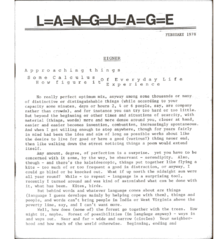
The anthology mentioned in the talk, The L=A=N=G=U=A=G=E Book (Poetics of the New), was published by Southern Illinois University Press, and is in print and available.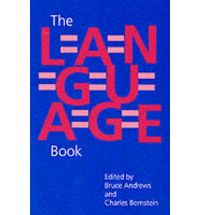 Note to listeners: as with all these historically based conversations about literary publishing, this is a relatively long listen, at about 48 minutes.
Note to listeners: as with all these historically based conversations about literary publishing, this is a relatively long listen, at about 48 minutes.
Podcast: Play in new window | Download

